2 schools lose fight to keep names secret following censored tours at Canadian Museum for Human Rights
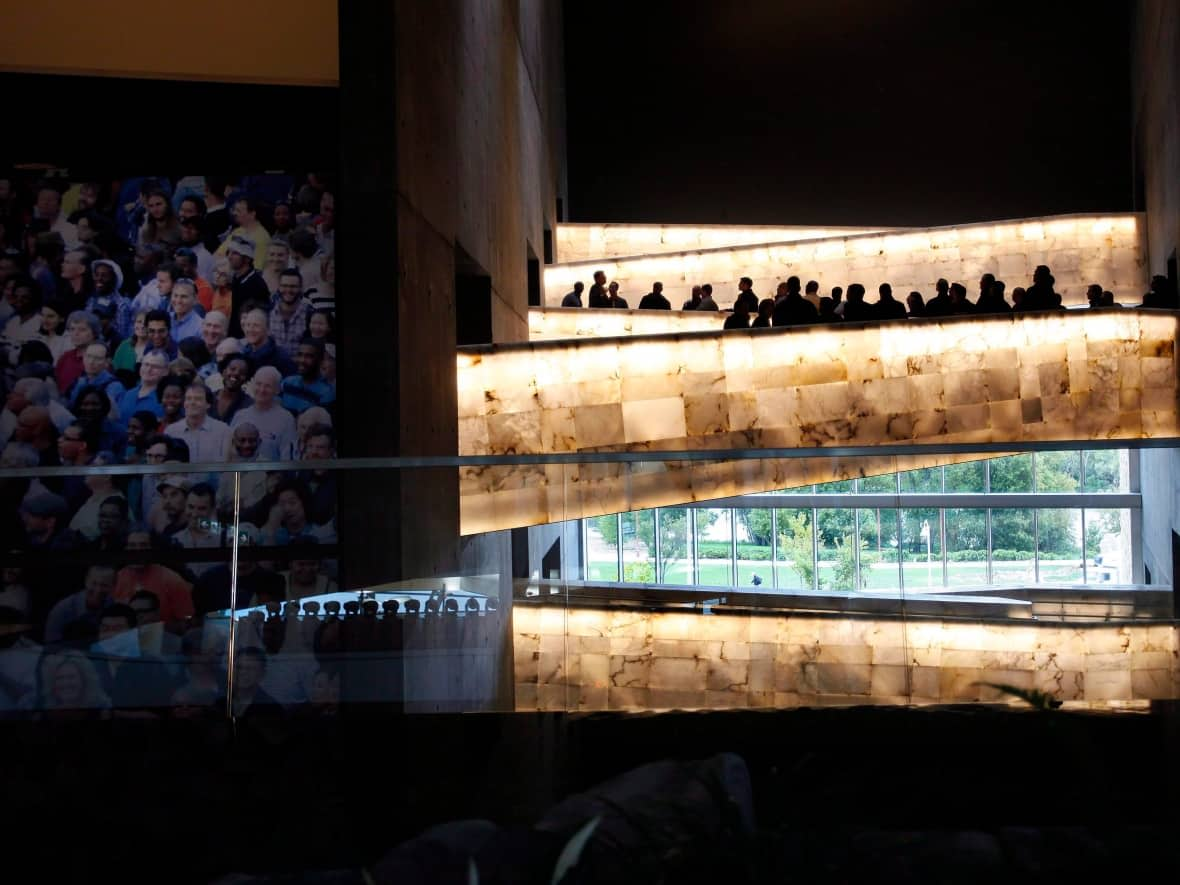
Two faith-based schools that asked the Canadian Museum for Human Rights not to show their students LGBT material during tours have lost a fight in federal court to keep their identities a secret.
Sterling North Stonewall, in Stonewall, Man., and Sterling West Pembina, in St. Vincent, Minn., both lost their battle to keep their names out of material the CMHR planned to give to the CBC in 2020, in response to an access to information request.
The two schools, which now operate under the OneSchool Global banner, filed an application to prevent the CMHR from releasing the names in information about how the Winnipeg museum had censored its exhibits at the request of some visiting groups.
"We are pleased the judicial review upheld our decision to release the records. As you know, the practice of censoring content ended in 2017, and it is important for us to be transparent about what took place," Riva Harrison, vice-president of external relations and community engagement at the CMHR, said in a prepared statement.
A spokesperson for OneSchool Global said it regrets any offence caused to any individual or group.
"This incident is one which the school regrets and has learnt from. Our teachers and students all uphold our core values, which include compassion, kindness and respect for all people."

The CBC fought for release of the records after reporting on the CMHR's willingness to block or avoid LGBT content in the museum at the request of touring groups.
The two Sterling schools, one in Stonewall, Man., about 30 kilometres northwest of Winnipeg, and the other in St. Vincent, Minn., just over the U.S. border about 100 km south of Winnipeg, had students in grades seven to 12 tour the museums. They and groups from Mallard School, Springwell Colony School, Omega School and Interlake Hutterian Schools all asked for censored tours.
After the CMHR notified the schools their names would be released to the CBC, the Sterling schools filed an application in Federal Court to prevent the museum from doing so.
The schools argued the release of their names as the entities that asked the museum to censor LGBT content would likely cause them financial harm, in the form of reduced grants and lower enrolment.
A federal judge granted the Sterling West Pembina and Sterling North Stonewall schools a confidentiality order that protected their identities while the case worked its way through the system.
Late last month, a more than 3,000-page court record detailing the dispute was made public after a judge ordered the records be released with minor redactions to protect the identities of the staff members who made the requests.
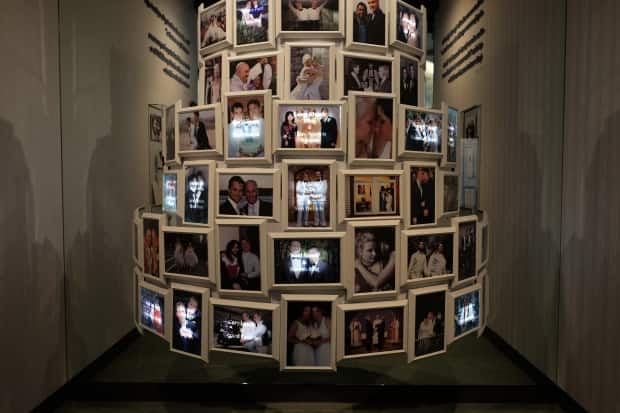
The internal documents from the CMHR that have now been released show the schools each made requests that their students not be exposed to certain content. Some specifically asked that content pertaining to LGBT and women's rights and abortion not be discussed, and some asked that a same-sex marriage display not be shown, the documents say.
An academic who has researched a religion associated with the Sterling schools said it's not surprising to him that they fought for years to keep the school names out of the public eye.
OneSchool Global's website says it was established by members of the Plymouth Brethren Christian Church for students and families of the church.
"The Plymouth Brethren has historically tried to stay out of the public eye a great deal," said Robin Willey, assistant professor of sociology at Concordia University of Edmonton.
The church, which says it has over 50,000 members across Australia, New Zealand, Europe, the U.K. and the Americas, is an exclusive community that follows a doctrine of separation, said Willey, who teaches about religious movements.
"They set up their own businesses and their families remain quite separate from the communities they're in to keep that exclusivity, that sort of like separation from everyday society."
The church campaigned against gay marriage in Canada in 2005 through an anonymous mail and advertising campaign, Willey said.
He found it interesting that students were taken to the human rights museum at all.
"But then definitely, when you're in that space, you'd want to ensure that your members aren't going to encounter things that may challenge their perspective, if you want to maintain that sort of strict exclusive understanding of the world," he said.
In the fight to keep their names from the CBC, the Sterling schools argued their focus was on protecting the privacy of children who would be affected by the disclosure.
The information could be used to learn about their students' "education history," which is protected under Canada's access to information laws, the schools argued.
An affidavit from Lucas Bedell, the education director of OneSchool Global, said the schools also feared negative media attention would result in lost relationships with current students and staff.
The attention could affect the schools' ability to attract new staff and get donations, and impact enrolment numbers, Bedell said in his affidavit.
"The corporation recently lost a key new hire in New Jersey due to some false media coverage unrelated to these proceedings. I believe that if the records are released, and the third parties' school names are released to the media, it is likely to impact on the third parties' ability to hire and retain staff," he said in a February 2021 affidavit.
Bedell said OneSchool Global provides "educational support" to the two Sterling schools, which charge tuition fees and receive government funding on a per-student basis.
Lawyers for the Sterling schools argued that negative media attention after school shootings in the United States led to revenue loss from decreased enrolment, and it was therefore likely they would suffer similarly if the records were released.
The negative impact of having the names released would likely last years, they said.
"It is reasonable to assume that this phenomenon is not limited to school shootings but that negative media attention in general will impact enrolment," wrote Calgary lawyer Gerald D. Chipeur, of Miller Thompson LLP. The claim was repeated in Bedell's affidavit in front of the Federal Court.
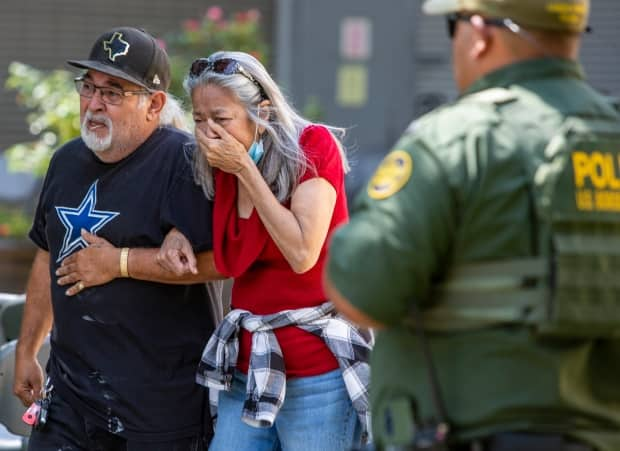
Justice Catherine Kane didn't accept that argument and said the schools failed to establish any possible harm to their competitive position.
"The applicants have completely failed to show any evidence about the effect that possible press coverage will have on them," Kane said in her decision.
There is no reason for the court to conceal more information than necessary, her decision said.
"It is illogical and contrary to the purposes of the act to permit, as the applicants appear to request, the court's record to protect information the applicants do not want to be public.… Public relations issues need not be addressed by the court."
Ken Rubin, an investigative researcher and access to information expert, said this case reinforces that "embarrassment is not an exemption under any access act."
'Secrecy acts'
Rubin said it's common for third parties to block access requests when there's information that is considered commercial.
"One of the problems with all access laws in Canada … is they're primarily secrecy acts, and one of the ways that they are secrecy acts is they allow commercial entities too much leeway," he said in an interview from Ottawa.
Egale Canada, a national organization that advocates for better inclusion of LGBT Canadians, said it was shocking that students were denied the opportunity for an inclusive education while visiting the human rights museum, which provided censored tours from 2015-17.
"We're upset about what has happened, and I think more needs to be done to address the harm that was caused. It's still raw, frankly," said Helen Kennedy, executive director at Egale, in an interview from Toronto.
Egale Canada is calling for the CMHR to set up an exhibit about its own failures to protect human rights.
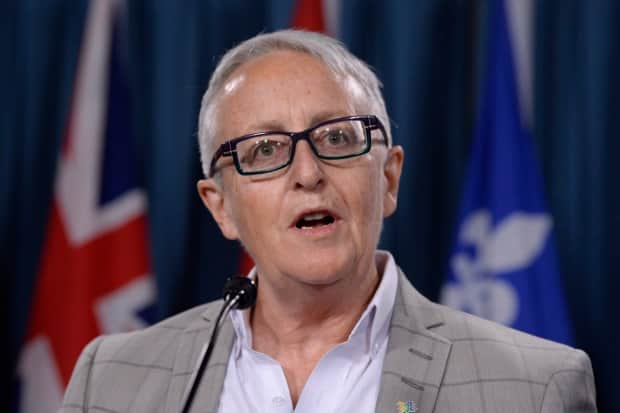
"When you have a museum of this stature spotlighting human rights issues and then is participating in those very human rights violations that they're exhibiting, that story needs to be told," Kennedy said.
She said a previous apology from the museum for the practice and consultations with LGBT groups didn't do enough to repair the harm caused.
Harrison said the CMHR talks about its controversy-filled history with visitors and how it learned and grew as it developed LGBT content.
"Acknowledging our journey is part of rebuilding trust, and we continue to work on this in a variety of ways. We've increased diversity in hiring at all levels at the museum, and staff continue to guide the museum through the rainbow equity council."
Harrison said the CMHR is working on creating new content that shares two-spirit stories, and is working with the LGBT Purge Fund on a new major exhibition that will tell the story of how LGBT federal government employees were persecuted and discriminated against.
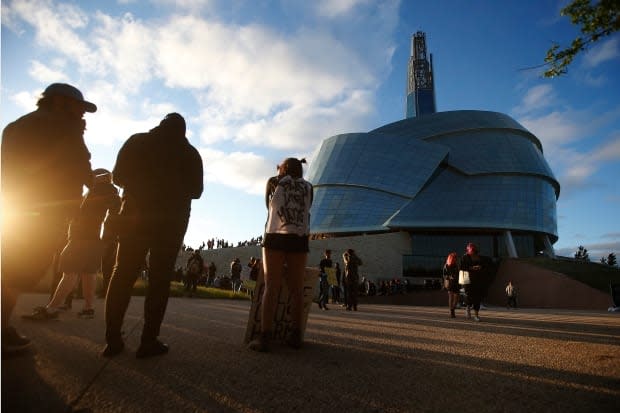
Justice Kane found the museum and the CBC were both entitled to have their legal costs paid for by the Sterling schools.
Only OneSchool Global returned a request for comment. The other schools that requested censored tours and were listed in internal museum records didn't respond to CBC News.


